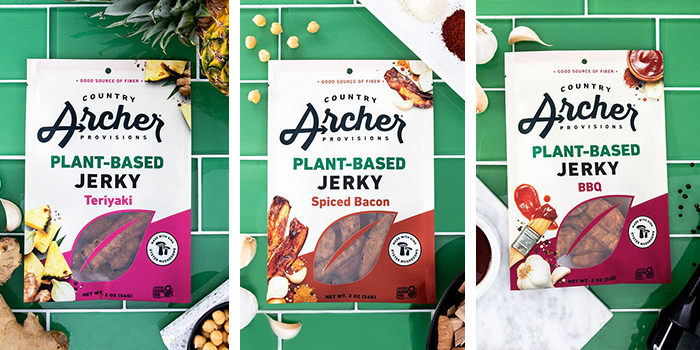Country Archer Launches Mushroom Jerky, Brings on New Executive Team

Meat Snacks brand Country Archer is making moves from grass-fed beef to mushrooms, announcing today the launch of a new line of plant-based jerky. The launch comes after the company also added new CPG leaders to its executive team in preparation for its next phase of growth.
What Is the Product?
Debuting online and then in Sprouts and Whole Foods Markets later this year, Country Archer’s Mushroom Jerky will be available in Hickory, Spiced Bacon and Barbecue flavors. The plant-based line will retail for $7.99 for a 2 oz. bag, a slight increase in price over the brand’s grass-fed beef and zero sugar jerky.
Unlike many other plant-based jerkies on the market, Country Archer’s line is gluten-free and soy-free, using a base of king oyster mushrooms in place of other meat alternatives such as soy or pea protein. Still, despite the fungi base, the line has four grams of protein per serving and three grams of fiber.
Why Plant-Based?
Establishing a presence in plant-based meat had always been part of the brand strategy since 2019, CEO and founder Eugene Kang said, with the question more a matter of when rather than why.
“Most brands will chase innovation without really looking at data and some proof validation points,” Kang said. “We had conviction that plant-based jerky was going to be a subcategory. I think where we did not have clarity on is what was truly going to move the needle in terms of where consumers wanted it to be.”
To begin setting the stage for the pivot, the company underwent a rebrand in 2020 and also changed its name from Country Archer Jerky to Counter Archer Provisions — a subtle difference Kang said offered it permission to play in more categories. With the new design in hand, and several new beef-based launches on shelves, Kang said, there was time to invest in the new plant-based product without risking the core business.
“I think we’re actually probably entering at the right time,” Kang said. “It’s hard, right? How do you have permission to enter into a category and subcategory, that hasn’t really been proven out yet?”
What’s the Landscape?
There are certainly plenty of other plant-based jerkys on the market, with Louisville Vegan Jerky Company, Gardein and It’s Jerky Y’all all offering 100% vegan lines. Meanwhile, both Krave Snacks and Perky Jerky have both launched plant-based options to compliment their meat jerkys and Pan’s, Moku and Eat the Change have both launched their own mushroom-based products.
Still, Kang said, in his opinion most of these options fall flat when it comes to both offering a clean ingredient deck (in particular, avoiding highly processed soy) and great taste. For Country Archer, the goal was to create a product that wouldn’t just appeal to vegans, but instead also flexitarians. That meant creating a line that had the chew and texture of traditional meat-based jerky.
“Being authentic to who we are as a brand, I don’t think that it would have made sense for us to come out with another soy based protein jerky,” Kang said. “We had to do it in a way that fits the broader pieces and ethos of our business, and that’s using real ingredients.”
For that, the company once again partnered with chef Will Horowitz, the owner of (now closed) restaurant Duck’s Eatery, who had also crafted Country Archer’s Zero Sugar Jerky line last year. Horowitz has developed a reputation in the industry for creating whimsical plant-based versions of meat dishes, such as a carrot hot dog or watermelon-based ham.
The resulting jerky is notable not only for its meat-like experience, Kang said, but also because it can be processed using the same marinades and machinery as its meat products, allowing the company to save on costs.
What is the Greater Strategy?
Country Archer is currently sold in more than 17,000 retailers across club, mass, foodservice and natural channels, including Whole Foods Market, Starbucks, Safeway, Costco, Kroger, Target, 7-Eleven and Hudson News. In the natural channel, Country Archer has a 30% share of the jerky segment, Kang said, and launching the new plant-based line will help the company deepen that presence. Plant-based options currently represent 12% of the natural meat snack category across meat snacks, jerky and sticks, he said.
At the same time, the company will seek to avoid cannibalization from its existing core line of meat snacks.
“We want to fish where the fish are swimming,” Kang said. “What we don’t want to do is introduce [consumers to] plant-based ahead of our core line, because the reality is we still have so much whitespace in conventional, convenience, club and mass with our core jerky line…we have this partnership dynamic that allows us to be a little bit more adventurous in natural, but we don’t have that same level of depth in conventional just yet.”
Going forward, the company plans to explore other ways to also capture flexitarian eaters either with other plant-based snacks or hybrid products that focus more on reducing meat consumption.
On the business side, the company has also invested heavily in building out its executive team. In June, Adam Razik (the former COO/CFO/Co-founder of Bright Foods and former GM of Kevita) joined as CFO while in May Stephanie Paras (the former VP of operations for RxBar) joined as COO. The duo joins Michelle Flegel (former EVP of sales at Tillamook Country Smoker), who came on in January to run sales.
“You can have the best brand and the best product, but if you don’t have the right talent in place, you literally handicap yourself as a business,” Kang said. “It’s a different level of experience to go north of $100 million and that’s the goal.”

















